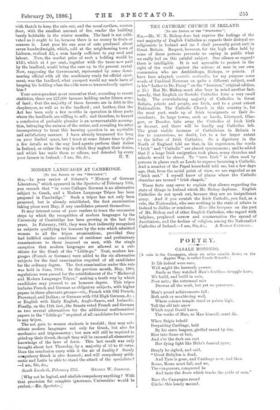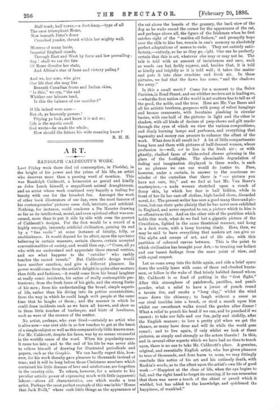POETRY.
CASALE ROTONDO.
[A ruin in the Campagna, about six miles outside Rome, on the
Appian Way, is called Casale Rotondo.1
Is life indeed were ours, Well might the heavenly powers Smile as they watched Man's fruitless struggle here; We build, and build in vain, Poor ants ; the autumnal rain Drowns all the work, but yet we persevere.
Man's proud achievements fall ; Heft arch or mouldming wall,
Where solemn temple stood or palace high,
Tell the old tale anew
Which royal David knew,
The works of Man, as Man himself, must die.
When Scipio beheld Despairing Carthage, held By his stern leaguer, girdled round by fire, Rise into flame at last, And o'er the dark sea cast Her dying light like Dido's funeral pyre ; Deeply he sighed, and said, "Great Babylon is dead, And Tyre is gone, and Carthage now, and then Rome, Rome must fall, and we, The conquerors, conquered be And taste the doom which tracks the pride of men:' Bare the Campagna round Circles this lonely mound, Half tomb, half tower,—a dust-heap,—type of all The once triumphant Rome, Now beneath Peter's dome Crouched yonder, shrunk within her mighty wall.
Mistress of many lands, Imperial England stands, Through East and West by force and law prevailing ; Say ! shall we see the fate Of Rome dissolve her state, And Albion's star of fame and victory paling ?
And we, her sons, who give Our life that she may live Beneath Canadian frosts and Indian skies, "Is this," we cry, "the end Whither our labours tend, Is this the balance of our sacrifice ?"
If life indeed were ours—
But oh, ye heavenly powers !
Pitying ye look, and know it is not so ; Life is the mystic scroll God wrote—he reads the whole ; How should the letters his wide meaning know ?
B. H. H.



































 Previous page
Previous page